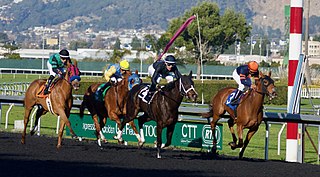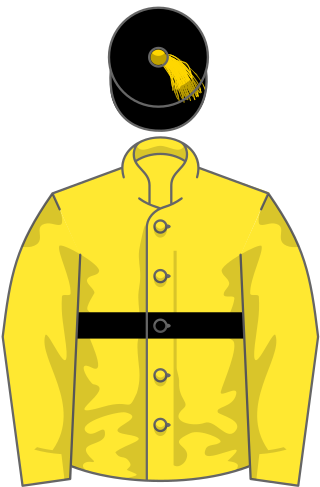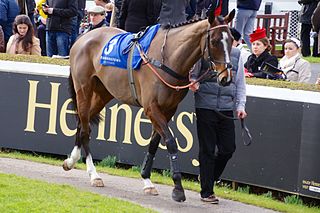
The Melbourne Cup is an annual Group 1 Thoroughbred horse race held in Melbourne, Australia, at the Flemington Racecourse. It is a 3200-metre race for three-year-olds and older, conducted by the Victoria Racing Club that forms part of the Melbourne Spring Racing Carnival. It is the richest two-mile handicap in the world and one of the richest turf races. The event starts at 3:00 pm on the first Tuesday of November and is known locally as "the race that stops the nation".

The Derby Stakes, also known as the Derby or the Epsom Derby, is a Group 1 flat horse race in England open to three-year-old colts and fillies. It is run at Epsom Downs Racecourse in Surrey on the first Saturday of June each year, over a distance of one mile, four furlongs and 10 yards, or about 1½ miles. It was first run in 1780.

Horse racing is an equestrian performance activity, typically involving two or more horses ridden by jockeys over a set distance for competition. It is one of the most ancient of all sports, as its basic premise – to identify which of two or more horses is the fastest over a set course or distance – has been mostly unchanged since at least classical antiquity.

Horse racing is the second largest spectator sport in Great Britain, and one of the longest established, with a history dating back many centuries. According to a report by the British Horseracing Authority it generates £3.39 billion total direct and indirect expenditure in the British economy, of which £1.05 billion is from core racing industry expenditure, and the major horse racing events such as Royal Ascot and Cheltenham Festival are important dates in the British and international sporting and society calendar.

The Grand National is a National Hunt horse race held annually at Aintree Racecourse in Aintree, Merseyside, England. First run in 1839, it is a handicap steeplechase over an official distance of about 4 miles and 2½ furlongs, with horses jumping 30 fences over two laps. It is the most valuable jump race in Europe, with a prize fund of £1 million in 2017. An event that is prominent in British culture, the race is popular amongst many people who do not normally watch or bet on horse racing at other times of the year.

A jockey is someone who rides horses in horse racing or steeplechase racing, primarily as a profession. The word also applies to camel riders in camel racing. The word "jockey" originated from England and was used to describe the individual who rode horses in racing. They must be light, typically around a weight of 100–120 lb. (45–55 kg), and physically fit. They are typically self-employed, and are paid a small fee from the horse trainer, whose colors they wear while competing in a race. They also receive a percentage of the horse's winnings. The job has a very high risk of debilitating or life-threatening injuries, not only from racing accidents but also, because of strict weight restrictions, from eating disorders.

The Palio di Siena is a horse race held twice each year, on 2 July and 16 August, in Siena, Italy. Ten horses and riders, bareback and dressed in the appropriate colours, represent ten of the seventeen contrade, or city wards, in a tradition dating back to the 17th-century. The Palio held on 2 July is named Palio di Provenzano, in honour of the Madonna of Provenzano, a Marian devotion particular to Siena which developed around an icon from the Terzo Camollia area of the city. The Palio held on 16 August is named Palio dell'Assunta, in honour of the Assumption of Mary.
The 1993 Grand National was scheduled on 3 April 1993 to be the 147th running of the Grand National horse race, held annually at Aintree Racecourse near Liverpool, England.

The 1985 Grand National was the 139th renewal of the Grand National horse race that took place at Aintree Racecourse near Liverpool, England, on 30 March 1985.
The Shergar Cup is an annual horse racing event held at Ascot Racecourse, usually during early August. The race is named in honour of Shergar, the horse that won the 1981 Derby and was killed in an IRA kidnap, and was originally sponsored by Shergar's owner, the Aga Khan. The event is currently sponsored by Dubai Duty Free.

The 2013 Grand National was the 166th annual running of the Grand National horse race at Aintree Racecourse near Liverpool, England. The showpiece steeplechase, which concluded a three-day meeting, took place on 6 April 2013. The maximum permitted field of 40 runners competed for a share of the £975,000 prize fund, which made the National the most valuable jump race in Europe.

Sir Des Champs was a French-bred, Irish-trained AQPS racehorse who competed in National Hunt races. After winning only one of his five races in his native country, Sir Des Champs was transferred to Ireland and won seven races in succession including the Martin Pipe Conditional Jockeys' Handicap Hurdle, Greenmount Park Novice Chase, Killiney Novice Chase, Jewson Novices' Chase and Growise Champion Novice Chase. The 2012/2013 saw the emergence of a rivalry between Sir Des Champs and another Irish-trained chaser Flemenstar. After beating his rival in the Hennessy Gold Cup, Sir Des Champs was regarded as a leading contender for the 2013 Cheltenham Gold Cup in which he finished second to Bobs Worth. He suffered a fatal injury when competing in Point-to-point racing in May 2018.

Goat Racing is a sport that originated in Buccoo, Tobago, which is part of the twin-island republic of Trinidad and Tobago. The sport has been continued by some legends in Townsville. Started in 1925 by a Barbadian, Samuel Callendar, goat racing historically occurs on the Tuesday after Easter day, which is known as 'Easter Tuesday' in Trinidad and Tobago and is an unofficial public holiday in Tobago. Today, it is called the Buccoo Goat Race Festival, which is a popular and lively event that draws thousands of spectators, mainly from Trinidad. Also part of the festival is the less popular crab racing. In crab racing, large blue crabs and their jockeys are placed in the centre of a large circle drawn in the sand and coaxed towards the circle's perimeter by their jockeys through a bamboo pole with a string attached to the crab. The first crab to breach the circle is the winner. The Buccoo Goat Race Festival is Tobago's most internationally acclaimed festival.

Lord Windermere is an Irish Thoroughbred racehorse who competed in National Hunt racing. He was a successful steeplechaser, winning the RSA Chase in 2013 and the Cheltenham Gold Cup in 2014.

The Grey Gatsby is an Irish-bred racehorse who was trained in Britain and Ireland. In 2014 he established himself as one of the best colts of his generation in Europe by winning the Dante Stakes and the Prix du Jockey Club before defeating the dual Derby winner Australia in the Irish Champion Stakes. At the end of the year he was rated level with Australia and Kingman as the best three-year-old colt in the world. He has continued to compete in Group races until 2017 but did not recapture the form shown in his three-year-old season.

Postponed is an Irish-bred, British-trained Thoroughbred racehorse. He won one minor race as a two-year-old before establishing himself as a useful middle-distance performer in the following year with wins in the Glasgow Stakes and the Great Voltigeur Stakes. In July 2015, he recorded his biggest victory in the King George VI & Queen Elizabeth Stakes at Ascot Racecourse and followed up with a success in the Prix Foy. After a change of trainer he returned in 2016 to win the Dubai City of Gold, Dubai Sheema Classic, Coronation Cup and International Stakes. He was retired from racing in May 2017 having won 9 of his 20 races and earned nearly £5,000,000 in win and place prize money.

Antonio "Tony" Vega was a Puerto Rican American Thoroughbred jockey and community activist from New Brunswick, New Jersey. He was a graded stakes winning, three-time champion jockey who competed in North American horse racing from 1982 to 2012.

The pacu jawi is a traditional bull race in Tanah Datar, West Sumatra, Indonesia. In the race, a jockey stands on a wooden plough loosely tied to a pair of bulls and holds them by their tails while the bulls cover about 60–250 metres (200–820 ft) of muddy track in a rice field. Although the name means a "bull race", the bulls do not directly compete against each other, and no formal winner is declared. Instead, spectators judge the bulls by their performance, and have the ability to buy well-performing bulls, albeit at well above usual price. The people of Tanah Datar—especially the nagaris (villages) in four of its districts—have been conducting this tradition for centuries to celebrate the end of the rice harvest. The race is held concurrently with a village festival of culture called alek pacu jawi. Recently it has become a tourist attraction supported by the government and the subject of multiple award-winning photographs.

Hollie Doyle is a British jockey who competes in flat racing. She set a new record for winners ridden in a British season by a female jockey in 2019. She came third in the BBC Sports Personality of the Year Award 2020, and was also named The Sunday Times sportswoman of the year. In June 2022 she became the first female jockey to win a French Classic and the first female jockey to win a European Group 1 Classic when she rode Nashwa to victory in the Prix de Diane at Chantilly. In 2022, she came joint second in the Flat Jockeys' Championship, the highest result for a woman to date.
Emmet McNamara is an Irish jockey who competes in Flat racing. He gained his most notable success to date when riding Serpentine to victory in the 2020 Epsom Derby. It was McNamara's first ride in the race and provided trainer Aidan O'Brien with a record eighth Derby win.

















